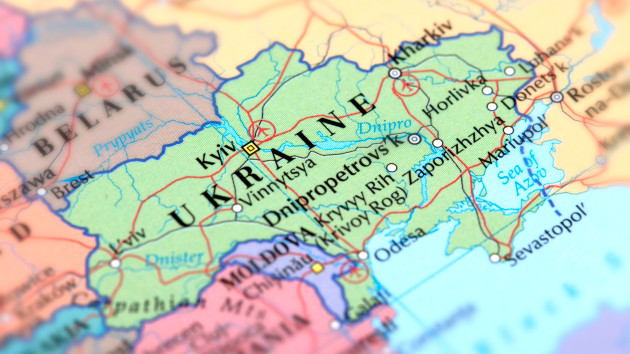
(LVIV, Ukraine) — Ukrainian and foreign tech companies are providing an array of tech and cyber support to Ukraine in its fight against Russia, Ukrainian officials and tech experts said, with some of the country’s top commanders saying they plan to buy about 1,000 more drones.
“Ukraine needs all the categories of drones: huge ones, small ones, kamikaze drones,” Ivan Tolchynskyi, CEO of Atlas Aerospace, a compact drone manufacturer, said at a conference in Lviv this month.
The Ukrainian Ministry of Digital Transformation along with the General Staff said this month that they’d spend almost $500,000 to buy about 1,000 drones.
Small drones have become popular in Ukraine “because every soldier probably wants to get their own drone on the battlefield,” Tolchynskyi added. His company has provided the Ukrainian army with about 150 drones and plans to increase the number of deliveries to “1,000 by the end of this year.”
Ukraine’s cause is also boosted by non-combat drones and special equipment, such as the mine-detection technology and medical drones supplied to various NGOs by the Canadian company Draganfly.
“We originally came to Ukraine with our medical response drone that carries about 30 pounds of temperature sensitive supplies – such as insulin or pharmaceuticals – for search and rescue battlefield missions,” Cameron Chell, president and CEO of Draganfly, said.
While drones help defend Ukraine’s skies and territory, the country also needs solid protection in cyberspace to repel attacks by Russian hackers.
“On average, we register around 200 attacks every day. Sometimes it is 500 a day and sometimes it is 50, but it happens every day,” Oleksandr Bornyakov, deputy minister of Digital Transformation, said.
“We may not see it, we may not know what is really going on behind the scenes,” Kim Zetter, a cybersecurity journalist, added.
Yet according to NATO Cyber Defense Center Ambassador Kenneth Gears, “[W]e have probably seen what Russia has.”
As troops in the battlefield don’t do anything without hacker support these days, Gears said, the “very poor results that we see on the battlefield from the Russian army are in part the result of failed cyber-attacks and cyber defenses of the Russian army.”
But in Ukraine, the IT sector — and cyber warfare — seems to be thriving, industry officials said.
“The IT industry is one of the most resilient industries in Ukraine right now, maybe the most resilient. We are able to perform very efficiently during these times,” Vitaly Sadler, CEO and co-founder of Intellias, an IT development company, said.
Ukraine boasts an informal “IT army” — a gathering of over 200,000 anonymous volunteers who are coordinating via the Telegram messaging app. This motley crew of “hackers” performed online attacks on very sensitive Russian targets, targeting banks, civil aviation databases and even the Federal Security Service website.
Ukraine may even conscript a few IT specialists fleeing Russia on the back of the partial military mobilization announced by Moscow on Sept. 21, said Bornyakov, adding that the recruitment is likely going to be limited.
“I don’t think Ukrainian society is ready to accept even ‘good Russians.’ We might consider this on a very personal basis after conducting complete research on each person,” Bornyakov said.
Russian hackers are in a more vulnerable position once they leave Russia.
“Right now, they are protected by the Russian government — the NSA and the U.S. cyber command know many of them. And Russia is going to be focused primarily on its own defense,” he said.
Copyright © 2022, ABC Audio. All rights reserved.





